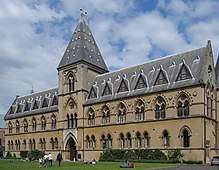Benjamin Woodward
Benjamin Woodward (16 November 1816 – 15 May 1861) was an Irish architect who, in partnership with Sir Thomas Newenham Deane, designed a number of buildings in Dublin, Cork and Oxford.

Life
Woodward was born in Tullamore, County Offaly, Ireland. He trained as an engineer but developed an interest in medieval architecture, producing measured drawings of Holy Cross Abbey in County Tipperary. These drawings were exhibited at the RIBA in London in 1846.
The same year he joined the office of Sir Thomas Deane and became a partner in 1851 along with Deane's son, Thomas Newenham Deane. It seems that Deane looked after business matters, and left the design work to Woodward.
Woodward's two most important buildings are the Museum at Trinity College, Dublin (1854-1857) and the Oxford University Museum of Natural History, Oxford, (1854-1860). He was also responsible for the Kildare Street Club in Dublin (1858-1861)[1] and Queen's College Cork, now University College Cork, (1845-1849).
The work of Deane and Woodward is characterised by naturalistic decoration with foliage and animals carved into capitals and plinths around windows and doors. It was extolled by John Ruskin in particular when he visited the Museum at Trinity College, Dublin. Woodward collaborated in particular with the O'Shea brothers. James and John O'Shea were stone carvers from County Cork. They, along with London sculptors, carved the abundant decorative stonework at Trinity, showing owls, lizards, cats and monkeys, as well as other flora and fauna.[1] Later the O'Sheas carved stonework at the Kildare Street Club, including the famous window piece showing the club members as monkeys playing billiards. Some stories tell of the O'Sheas getting into trouble and possibly even being sacked for carving cats or monkeys at the Oxford University Museum.
_(7655121100).jpg)
Notes
References
- Dodgson, Campbell (1901). . Dictionary of National Biography (1st supplement). London: Smith, Elder & Co.
Further reading
- Frederick O'Dwyer, The Architecture of Deane and Woodward, Cork, 1997 (ISBN 0-902561-85-5)